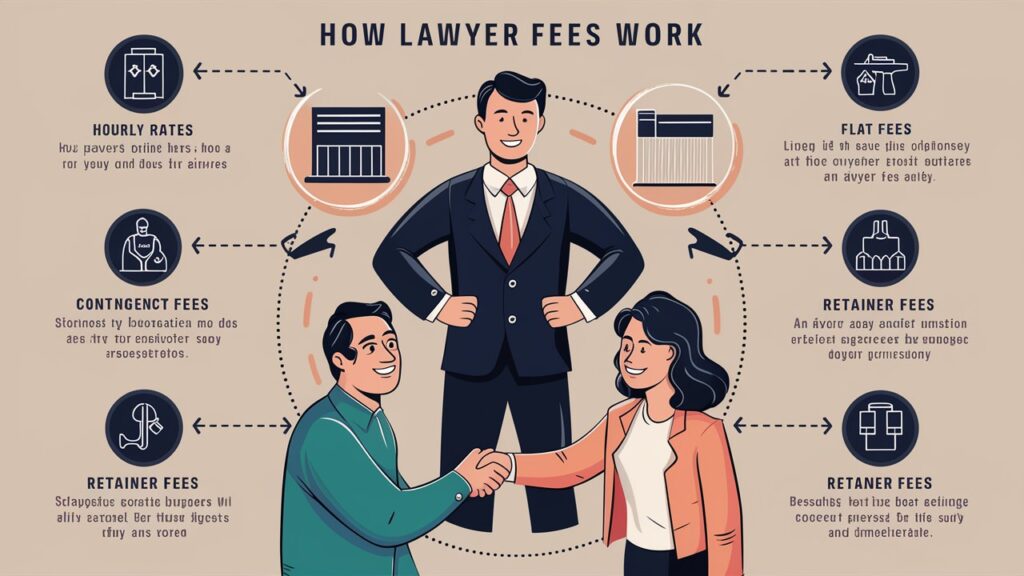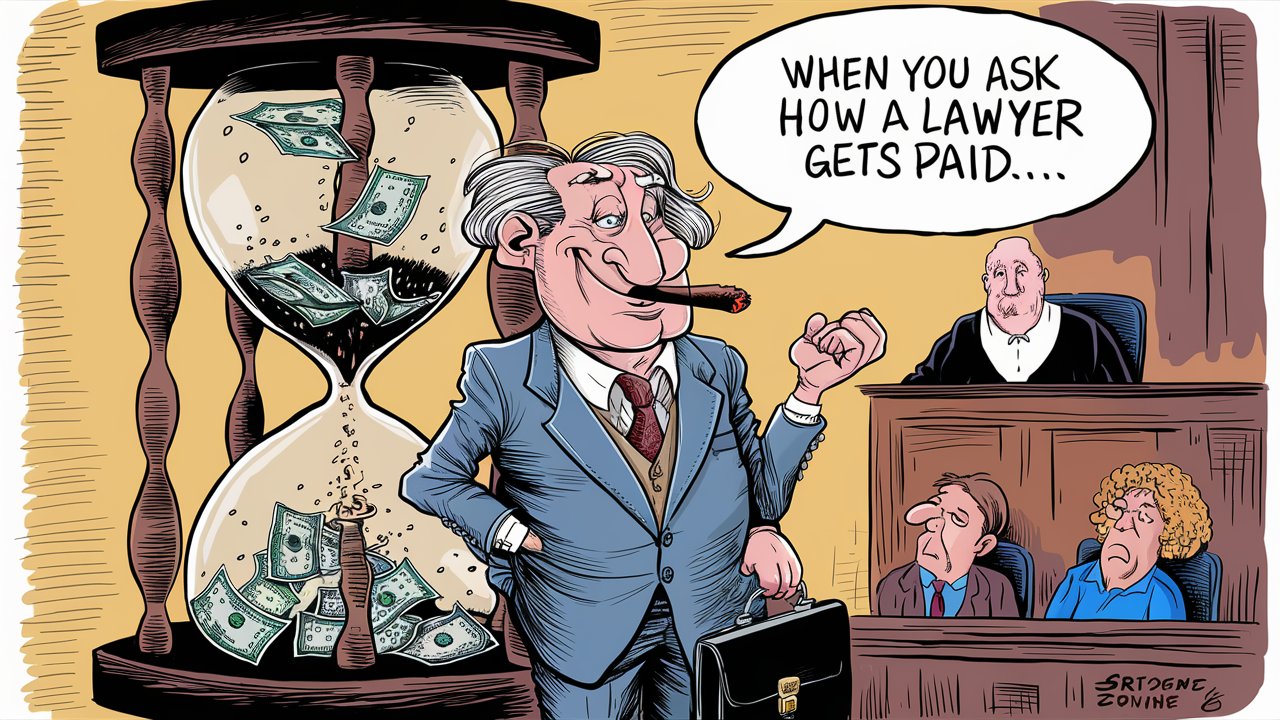Lawyer fees refer to the compensation that attorneys charge for their services. These fees can vary widely depending on several factors, including the complexity of the case, the attorney’s experience, and the geographic location.
1. Hourly Rate vs. Flat Fee: Understanding the Basics
Hourly Rate
Many attorneys charge clients by the hour, billing for the time spent working on the case. Hourly rates can vary significantly based on the attorney’s expertise and the nature of the legal matter. Clients are typically billed for the actual time spent on tasks such as research, drafting legal documents, and attending meetings or court appearances.
Flat Fee
Alternatively, some attorneys may offer flat fees for certain legal services. A flat fee is a set amount that covers all services related to a specific legal matter. This can provide clients with predictability and clarity regarding costs, as they know upfront how much they will be charged for the attorney’s services.
2. Retainer Fees: What You Need to Know
In addition to hourly rates or flat fees, some attorneys require clients to pay a retainer fee. A retainer fee is an upfront payment that serves as a deposit for future legal services. The attorney then draws from this retainer as work is completed on the client’s behalf.
3. Contingency Fees: How They Work
Contingency fees are commonly used in certain types of cases, such as personal injury claims. With a contingency fee arrangement, the attorney’s payment is contingent upon the outcome of the case. If the client wins the case or receives a settlement, the attorney receives a percentage of the compensation awarded. If the client does not prevail, the attorney does not receive payment for their services.
4. Additional Costs and Expenses
In addition to attorney fees, clients may be responsible for covering certain costs and expenses associated with their legal matter. These can include court filing fees, expert witness fees, travel expenses, and more. It’s important for clients to discuss these potential costs with their attorney upfront to avoid any surprises later on.

5. Factors Influencing Lawyer Fees
Experience and Expertise
The experience and expertise of an attorney can significantly impact their fee structure. More experienced attorneys with specialized knowledge or a successful track record may command higher fees than less experienced counterparts.
Complexity of the Case
The complexity of the legal matter at hand can also influence lawyer fees. Cases that require extensive research, complex legal arguments, or multiple parties involved may require more time and resources, resulting in higher fees.
Geographic Location
Legal fees can vary based on the geographic location of the attorney’s practice. Attorneys practicing in major metropolitan areas or regions with a higher cost of living may charge higher fees than those in smaller towns or rural areas.
6. Negotiating Lawyer Fees
Clients should feel empowered to negotiate lawyer fees to ensure they receive fair and reasonable pricing for legal services. While not all attorneys may be open to negotiation, discussing fees upfront and exploring potential payment options can help clients find a fee structure that works for them.
7. Transparency and Communication
Open and transparent communication between clients and their attorneys is essential when it comes to discussing fees. Clients should feel comfortable asking questions about billing practices, fee structures, and potential costs, and attorneys should provide clear and detailed explanations to address any concerns.
8. Understanding Billing Structures
Clients should have a clear understanding of how they will be billed for legal services. Whether it’s hourly rates, flat fees, or contingency fees, clients should know what to expect in terms of billing and be aware of any additional costs or expenses that may arise.
9. Managing Costs and Budgeting
Managing legal costs and budgeting for attorney fees is important for clients to ensure they can afford the representation they need. Setting a budget, discussing payment plans or financing options with the attorney, and prioritizing legal expenses can help clients navigate the financial aspects of their case more effectively.
10. Tips for Finding Affordable Legal Representation
Finding affordable legal representation doesn’t necessarily mean sacrificing quality. Clients can explore options such as pro bono services, legal aid organizations, or hiring attorneys who offer flexible payment arrangements to make legal services more accessible.
11. Common Misconceptions about Lawyer Fees
There are several common misconceptions surrounding lawyer fees, including the belief that higher fees always equate to better representation or that all attorneys charge exorbitant rates. In reality, the cost of legal services can vary widely, and clients should consider factors beyond just price when selecting an attorney.
12. The Importance of Discussing Fees Upfront
Discussing fees upfront and clarifying expectations regarding costs and billing practices can help avoid misunderstandings and disputes down the line. Clients should not hesitate to raise questions or concerns about fees during their initial consultation with an attorney.
Conclusion
Navigating lawyer fees can seem daunting, but with the right information and approach, clients can make informed decisions about their legal representation. By understanding different fee structures, factors influencing costs, and strategies for managing expenses, clients can find the right attorney for their needs while staying within their budget.
FAQs
1. How much do lawyers typically charge per hour?
- Hourly rates for attorneys can vary widely depending on factors such as location, experience, and the nature of the legal matter. On average, attorneys may charge anywhere from $150 to $500 or more per hour.
2. Can I negotiate lawyer fees?
- Yes, clients can often negotiate lawyer fees to some extent. It’s important to discuss fees upfront and explore potential payment options or alternative fee structures with the attorney.
3. What is a retainer fee?
- A retainer fee is an upfront payment that clients make to retain the services of an attorney. This fee serves as a deposit for future legal services and is typically drawn from as work is completed on the client’s behalf.
4. Are there any hidden costs or expenses associated with lawyer fees?
- Clients may be responsible for covering additional costs and expenses related to their legal matter, such as court filing fees, expert witness fees, or travel expenses. It’s important to discuss these potential costs with the attorney upfront to avoid any surprises.
5. How can I find affordable legal representation?
- There are several ways to find affordable legal representation, including exploring pro bono services, legal aid organizations, or hiring attorneys who offer flexible payment arrangements.










